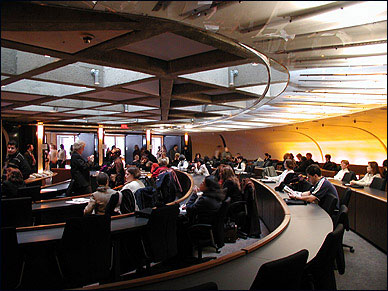Senators discussed the proposed revisions to the McGill Sexual Violence Policy (SVP) at the latest McGill Senate meeting on Feb. 20. The University first adopted a sexual violence policy in 2016, but new provincial legislation, specifically Bill 151, mandates that all Quebec universities implement sexual violence policies in accordance with its specifications. Recent allegations of inappropriate student-professor relationships on campus also motivated the revisions. In addressing these concerns, the new policy implements education on sexual violence for all members of McGill’s community, outlines a centralized reporting procedure for all allegations of sexual violence, and specifies time constraints for procedures initiated by disclosures. In Oct. 2018, McGill has hired an independent, specialized investigator to respond to reports of sexual violence.
Despite student protests at the Senate meeting in December, the new policy does not implement a blanket ban on intimate student-staff relationships, instead restricting romantic or sexual relationships between teaching staff and students under their direct authority or supervision. Additionally, any relationship between a professor and a student in the same faculty must be disclosed to an administrative officer.
“The revised policy […] is informed by a review of applicable law in Quebec, by the views expressed by diverse campus stakeholders on this topic, and by an examination of how other institutions […] have grappled with this complex issue,” Angela Campbell, associate provost (Equity and Academic Policies) said. “Ultimately, we must strike a balance between preventing and addressing […abuses] of power on the one hand, and, on the other, recognizing the rights of our community members to make private and intimate decisions without unjustified intrusions by the University.”
Other members of the Senate added that a ban on all teaching staff-student relationships might not be the most effective policy against sexual violence.
“[Members of the McGill Association for University Teachers] questioned whether such a ban would be manageable and expressed concern that such a ban would push unacceptable behaviour underground,” Department of Educational and Counselling Psychology Professor Alenoush Saroyan said. “A blanket ban of all intimate relations between any student and any faculty [member] is not a guarantee to [quash] behaviour that has no place in our academic community.”
Notably, the new policy does not distinguish between teaching staff relationships with undergraduate students and those with graduate students, which, according to Campbell, was done in recognition of the unique vulnerabilities that graduate students can face.
“An undergraduate student ban […] would be neglecting the graduate students, who are often more likely to be international, not have strong support networks, [and are] very dependent for things like funding, lab space, equipment et cetera,” Campbell said. “We decided to ensure that students were treated the same way to avoid the [implication] that, just because someone is three years ahead in their academic trajectory, does not suddenly empower them in some phenomenal way.”
Some senators raised concerns over the policy’s stance on disclosing substance use during an instance of sexual violence. While the revisions specify that no disciplinary action will be taken if alcohol or cannabis use is revealed in a complaint, no such specifications exist with regard to illegal substances.
“I can think of a situation [when someone] may possess an illegal substance and, in the course of an incident of sexual violence happening, that they would feel a barrier to [disclosing],” Bryan Buraga, the Students’ Society of McGill University (SSMU) Arts and Science Senator, said.
Campbell was cautious about the SVP elaborating on illegal substance use within the context of sexual violence, as guaranteeing that no disciplinary action will be taken in the event of illegal substance disclosure could be interpreted as condoning their use.
“It’s actually a legal question [as to] whether or not a policy can signal condonation for an illegal activity,” Campbell said. “The university doesn’t have any interest in putting inauthentic obstacles in the way of disclosure […], but, at the same time, we’re not clear [on…] whether or not a policy at the university can take a preemptive stance against illegal […] conduct.”
The Senate will vote on the revised SVP at its next meeting on March 27.







